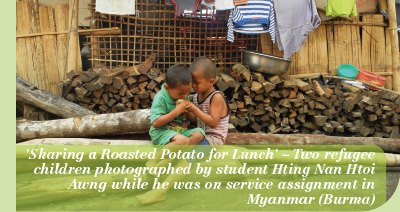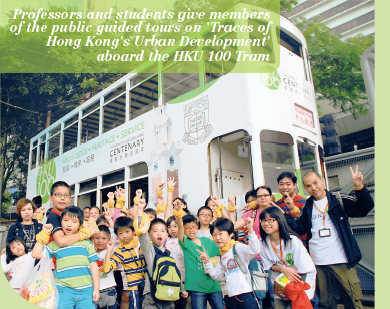 Reaching Out
Reaching Out
Apart from raising the stature of KE, the University has also dedicated itself to providing a support structure. KE is supported not only by the Knowledge Exchange Office and Technology Transfer Office, but also the KE unit in each faculty. These components work in partnership to provide training, publicity and encouragement for KE activities in all areas of the University. In December 2011 we also took the lead in organising a KE conference with the seven other UGC-funded institutions in Hong Kong that was attended by more than 570 participants, including some from Mainland China, Macau, Japan, Indonesia and the UK. The Conference provided a platform to share best practices in KE and showcase our success stories.
Another, most crucial form of support is funding. We allocate most of the funding we receive for KE to the faculties for capacity building and to individual academic staff for impact projects. Some funding is used to develop institution-wide initiatives, such as the HKU Scholars Hub, an online repository with information on about 1,500 professorial staff, including their contact details, research interests, publication lists, patents, community service and topics and languages in which they can comment in the media. The Hub is designed to make it easy for members of the public to discover research, potential research partners and experts, and by summer 2012 it had accumulated more than one million view counts.
 Competitive Funding
Competitive Funding
For impact projects, we have set up a competitive funding scheme that awards up to $100,000 per project. In 2011–12 we funded 46 projects led by academic staff and, under a pilot scheme, provided funding for 18 student-led KE projects. The latter will become a regular feature to help ensure all levels of the University embrace the KE concept and have an opportunity to practise it.
There is still much room for growth in KE at HKU and we will continue to promote it vigorously on campus. We can do this more effectively if we better understand the impacts of KE in the community, so we are exploring mechanisms that can achieve this. Unlike other academic activities, KE cannot be measured by the number of publications, yet the outcome can still be far-reaching. By sharing our assets – our expertise and knowledge – more widely, we can help society to overcome problems and enhance material, human, social, cultural and environmental well-being.